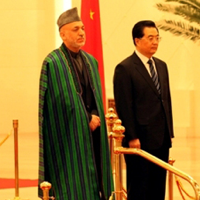As part of a conference hosted by Beijing University, I spent last week conducting interviews and participating in roundtables with Chinese academics and government officials. Many of these talks addressed recent developments in Afghanistan, a country of strong interest to China due to its proximity, natural resources and historical links to regional terrorism and narcotics trafficking. Based on my conversations and other sources, it is clear that Chinese policymakers hold conflicting sentiments regarding the planned U.S. and NATO military withdrawal from Afghanistan, which has already begun and will likely be completed in a couple years.
Chinese officials expressed their commitment to collaborate with the international community to promote political stability, social progress and economic development in Afghanistan. In pursuit of the latter, they are encouraging Chinese firms to secure access to Afghanistan's natural resources in order to develop them. They would also like to see Chinese companies involved in developing the country's infrastructure. As a framework for this participation, PRC officials stress the Chinese government's support for Afghanistan's National Development Strategy, which aims to reduce the underlying socio-economic causes of terrorism.
At the international level, Chinese officials want the Shanghai Cooperation Organization to play some role in Afghanistan's future, though they advocate having the United Nations coordinate all national and multilateral engagement in Afghanistan. Nevertheless, the Chinese government has declined to pursue invitations by NATO and the Afghan government to contribute combat forces to the NATO-led International Security Assistance Force (ISAF) seeking to pacify Afghanistan. The PRC has also dismissed NATO inquiries about sending military supplies -- even nonlethal ones such as food and clothing -- to Afghanistan through Chinese territory. Beijing's reluctance to side openly with NATO in Afghanistan reflects a fear of antagonizing the Taliban, which could retaliate against the PRC's growing economic interests in Afghanistan and perhaps again stir up trouble among China's Muslim minority.

